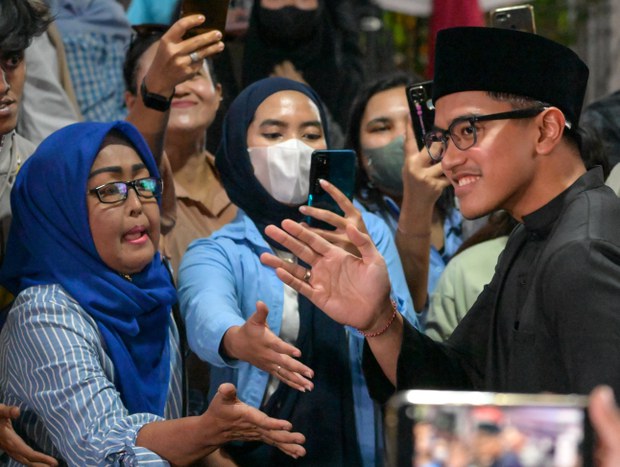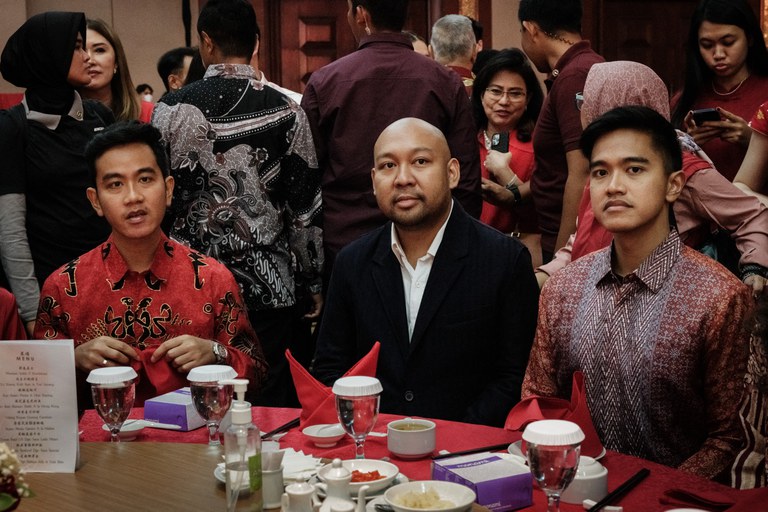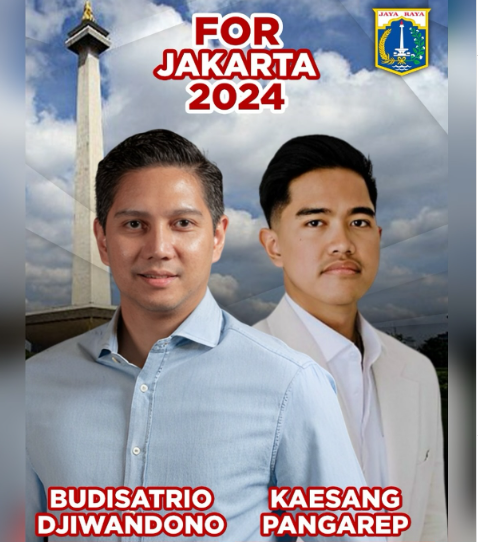Another Indonesian court issues ruling favoring a Jokowi scion, critics say
2024.05.30
Jakarta
 Indonesia Solidarity Party Chairman Kaesang Pangarep (right), youngest son of Indonesian President Joko Widodo and brother of winning vice presidential candidate Gibran Rakabuming Raka, arrives at the Jakarta home of winning presidential candidate Prabowo Subianto, March 20, 2024.
Indonesia Solidarity Party Chairman Kaesang Pangarep (right), youngest son of Indonesian President Joko Widodo and brother of winning vice presidential candidate Gibran Rakabuming Raka, arrives at the Jakarta home of winning presidential candidate Prabowo Subianto, March 20, 2024.
UPDATED at 6:20 a.m. EDT on 2024-05-31
A top Indonesian court has issued another ruling that raises questions about judicial neutrality and President Joko “Jokowi” Widodo’s political intentions as well as his dynastic aspirations before he leaves office in October.
This time the potential beneficiary, critics said, is Jokowi’s youngest son, Kaesang Pangarep. The Supreme Court on Wednesday handed down a decision to modify minimum age rules, a revision that would enable Kaesang, 29, to contest the November polls for deputy governor of Jakarta – as the strong buzz suggests.
In October 2023, the Constitutional Court issued a similar ruling that lowered minimum age requirements for certain presidential and vice presidential candidates. Six days later, Presidential hopeful Prabowo Subianto named Jokowi’s eldest son, Gibran Rakabuming Raka, his vice presidential nominee. Theirs was the winning ticket in the Feb. 14 general election.
The Supreme Court’s Wednesday ruling stipulated that candidates for the posts of governor or deputy governor must be at least 30 years old at the time of their inauguration – provided they win – unlike before when they had to meet that age requirement at the time of nomination.
The ruling cannot be challenged or appealed.
A constitutional law expert, Khairul Fahmi, said the Supreme Court’s decision had to be automatically implemented by the Election Commission.
“Similar to the Constitutional Court’s decision [of October], the Supreme Court’s lawsuit decision is also final,” Khairul told BenarNews.
Candidates for the local government elections later this year have to register between Aug. 27 and 29. The elections for governors, deputy governors, district heads and municipal mayors, among others, is set for Nov. 27.
The swearing in of the winners, which is also called the inauguration, is expected in January 2025.
And Kaesang, who was born in 1994, turns 30 on Dec. 25.
As one political observer noted, it was difficult to not suspect that the Supreme Court ruling had nothing to do with efforts to accommodate Kaesang.
“Is this to pave the way for certain individuals? That’s a reasonable suspicion because there is already a precedent,” Yoes Kenawas, from the Atma Jaya University Jakarta, told BenarNews, referring to the Constitutional Court’s ruling in October.
Kaesang is currently chairman of the small Indonesian Solidarity Party (PSI), which named him to the top post two days after he became a member.

The Supreme Court acted swiftly in delivering its ruling – three days, precisely.
A small outfit, the Garuda Party filed a petition on April 23 that said the rules should be changed so gubernatorial and deputy governor candidates need to be 30 years old upon their inauguration rather than their nomination, which was distributed to the judges on May 27.
Garuda Secretary General Yohanna Murtika said the party chairman’s petition was intended to open up opportunities for young people in the regional elections, and was not filed to facilitate Kaesang contesting.
“Don’t let young people be limited by age. … This lawsuit applies to anyone who has aspirations to serve the nation and state,” he said, according to a report by Media Indonesia.
The court revised the minimum-age limit at nomination for several other local government positions as well.
Last year, the Constitutional Court revised the minimum age for presidential and vice presidential candidates from 40 to any age, for those who have served as regional heads.
Jokowi’s eldest son, Gibran, was back then and still is mayor of Solo (Surakarta), pending his inauguration as vice president on Oct. 20.
The court’s chief justice, Anwar Usman, who is married to Jokowi’s sister, ruled on this petition. He was dismissed from his post in November for ethical violations linked to the ruling.
Jokowi, who was traveling in South Sumatra, refused to comment on the Supreme Court decision, saying it would be better for journalists to ask the top court directly. The popular president’s tacit support for Prabowo played a large role in the latter’s victory in the February presidential election.
And Jokowi’s son Kaesang, it is speculated, will run under the banner of Prabowo’s Gerindra Party in November’s election. Talk is that he will run for Jakarta deputy governor with Budisatrio Djiwandono, a nephew of the president-elect, running for governor of the nation’s capital.

This week a Gerindra politician Sufmi Dasco Ahmad created a stir when he uploaded a fake election poster featuring Budisatrio and Kaesang, which referred to them as Jakarta governor and deputy governor candidates, respectively.
The poster is an expression of people’s wish, said Habiburokhman, Gerindra deputy chairman, adding that he had heard from many Jakarta residents that they wanted the duo to run for election in the capital.
Critics saw Jokowi’s move to back Prabowo – his two-time adversary in the 2014 and 2019 presidential elections – as an attempt to maintain political influence and ensure his policies continue after he exits office due to term limits.
The February elections were the worst since the country’s democratic transition, said two watchdog groups, Indonesia Corruption Watch and KontraS, as they accused Jokowi of meddling and showing favoritism toward the ticket featuring his son Gibran.
‘An uncivilized democracy’
The ruling Indonesian Democratic Party of Struggle (PDI-P) criticized the Supreme Court’s ruling.
A “circumvention of the law,” was how PDI-P member Chico Hakim characterized the court’s decision.
“This is a form of avoiding the law and … is the highest form of betrayal of the ideals of reform,” he told BenarNews in a statement.
Meanwhile, one political science academic said he was struck by how swiftly the Supreme Court ruled on the case, when there was no urgent need to do so.
“Moreover, it was preceded by posters that appeared on social media. It seems there are prerequisites and agenda settings,” Cecep Hidayat, a lecturer at the University of Indonesia, told BenarNews.
Such a court ruling would only strengthen dynastic politics, said Yoes Kenawas of Atma Jaya University Jakarta.
And political elites such as people from such dynasties will destroy Indonesia’s fragile democracy, according to Siti Zuhro of the National Research and Innovation Agency.
“[Decisions like] these are the characteristics of an uncivilized democracy, proving that the factors inhibiting our democracy are actually the elites,” Siti told BenarNews.
Pizaro Gozali Idrus in Jakarta contributed to this report.
Correction: An earlier version incorrectly reported the date a petition was filed in the Indonesian Supreme Court.







